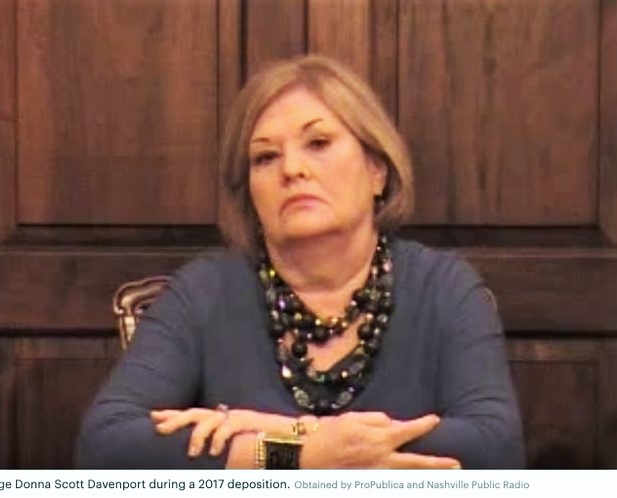Rutherford Co. Juvenile System Illegal Jailing Black Children leads to $11M Settlement
By Meribah Knight, Nashville Public Radio, and Ken Armstrong,
In the days after ProPublica’s investigation of the juvenile justice system in Rutherford County, Tennessee, one state lawmaker wrote that she was “horrified.” Another called it a “nightmare.” A third labeled it “unchecked barbarism.” A former Tennessee congressman posted the story about the unlawful jailing of kids and tweeted, “The most sickening and unAmerican thing I’ve read about in some time.”
On Tuesday evening, Oct. 12th, four days after the story was published, the president of Middle Tennessee State University notified faculty and staff that Donna Scott Davenport, a juvenile court judge at the heart of the investigation, “is no longer affiliated with the University.” Davenport had been an adjunct instructor at the school, which is based in Murfreesboro, Tennessee. For many years, she taught a course on juvenile justice. In 2015, she was one of the university’s commencement speakers.
Davenport did not respond to a request for an interview sent Tuesday evening. She declined to be interviewed for our previous story. On Friday, ProPublica published a detailed account, in partnership with Nashville Public Radio, about Rutherford County’s juvenile justice system, which Davenport oversees. The story chronicled how the county had illegally arrested and jailed children for years and in June settled a class-action lawsuit, agreeing to pay up to $11 million.

Rockvale, Smyrna, and Murfreesboro, Tenn., which is the County seat. Rutherford strongly supported the Confederacy during the Civil War and is where Confederate General Nathan Bedford Forrest led raids.
After ProPublica published its story on Tuesday, Oct. 5, 2021;
Sherrilyn Ifill, president and director-counsel of the NAACP Legal Defense and Educational Fund, wrote a thread on Twitter; she was “horrified” and called on the U.S. Department of Justice to investigate.
WKRN, a Nashville television station, published a story in which state senator, Jeff Yarbro, said, “It’s a horror show plain and simple.”
Gloria Johnson, a state representative, tweeted, “Our Democratic caucus will work to make sure this never happens again.” In an email to ProPublica, she wrote, “It is unimaginable and must be corrected.”
State Sen. Heidi Campbell wrote to ProPublica about the story, “As you might imagine, we are all horrified by it.”
State Rep. John Ray Clemmons, in a written statement, called it “unchecked barbarism,” adding, “we must admit that we’ve failed too many for far too long.”
On Wednesday, a Rutherford County spokeswoman said in an email that she had not yet had the opportunity to consult with Davenport about the interview request. She provided a written statement from the county’s mayor, Bill Ketron, which said in part, “I share our community’s concerns over a news story that was recently released involving Rutherford County’s juvenile justice system.” The mayor’s statement said that because of ongoing litigation in federal court, the county is “very limited in what can be discussed.”
Davenport is a graduate of MTSU, where she earned associate’s, bachelor’s and master’s degrees, according to a university press release from 2015. Davenport, in a monthly radio segment, has spoken frequently of her law enforcement background. In a sworn deposition in 2017, she said that while a student at MTSU she worked full time as a university police officer for two to three years. But her personnel file, obtained through a public records request to the university, showed her being a part-time dispatcher, then a full-time clerk-typist, then a full-time secretary.
The president of Middle Tennessee State University told staff, Judge Donna Scott Davenport “is no longer affiliated with the University.”
This year, Davenport’s LinkedIn profile said she had begun working as an adjunct at MTSU in 1996. (Her profile is no longer online.) She passed the bar one year earlier, in 1995, on her fifth attempt, she told lawyers in a deposition. In 1998, she was appointed to be a juvenile court referee, a position akin to a judge. In 2000, she won election to the newly created position of Rutherford County juvenile court judge, a job she has held ever since, winning reelection two times. She has said previously that she plans to run again next year for what would be an eight-year term.
Davenport’s MTSU personnel file shows that when she taught a three-credit course on juvenile justice in the fall of 2020, she was paid $2,400.
On Tuesday evening, a one-sentence email signed by MTSU’s president, Sidney McPhee, was sent to the university’s faculty and staff. “Adjunct instructor Judge Donna Scott Davenport, whose actions overseeing Rutherford County Juvenile Court have recently drawn attention in national media reports, is no longer affiliated with the University,” it said. The president’s message was also shared with students on Facebook.
We asked the university for an interview with McPhee. But an MTSU spokesman responded by email, “It is our practice not to comment on personnel matters.” The president’s one-sentence message “will likely be our only statement on this matter,” the spokesman wrote.
On Sunday, Oct. 10th: Vincent Windrow, senior pastor at Olive Branch Church in Murfreesboro and Nashville, delivered a sermon at both branches centered on the revelations by ProPublica and Nashville Public Radio about Rutherford County’s juvenile justice system. The story included a detailed account of Murfreesboro police arresting four Black girls at an elementary school in 2016. The officers handcuffed two of the girls, including the youngest, an 8-year-old. The kids were accused of watching some boys fight and not stepping in. (They were charged with “criminal responsibility for conduct of another,” which is not an actual crime. All the charges were later dismissed.)
“How traumatic must it have been, as someone who is in elementary school, to be handcuffed? Were they going to resist arrest? As a 9-year-old, as a 10-year-old?” the pastor told the congregation in Nashville, according to a video of the sermon. “How in the world do we expect folk to respect law enforcement when they get treated with such a lack of dignity, such a lack of respect, such a lack of love?”
“How can we expect our children to grow up and admire police when they have been treated in such a contemptible way? Who will it be next? Whose child will it be next? Let it end, and let it end now.”
Windrow also works at MTSU, where he serves as associate vice provost for student success. In his Sunday sermon he encouraged parishioners to call on the MTSU president and governing board to ask why Davenport was being allowed to continue on. “What is she teaching the students?” Windrow said. “What are they learning in their criminal justice administration classes? What is she trying to convey to them? More of the same?”
In Rutherford County, Davenport instructed police on what she called “our process,” telling them that upon arresting children, they should take them to the juvenile detention center. There, staff used a policy called the “filter system” to decide which children to hold. That system, broad and vague, was illegal. A federal judge ordered an end to it in 2017. Davenport oversees the juvenile detention center and appointed its director. In 2014, among cases referred to juvenile court, Rutherford County locked up children in 48% of its cases. The statewide average was 5%.






